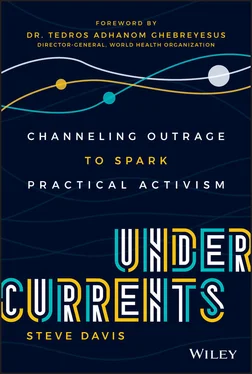My colleagues and partners at PATH taught me much about channeling outrage into optimism. Every day, they demonstrated the heavy lifting of practical activism, what it takes to jump in, work behind the scenes on complicated issues, and commit to life‐changing impact over decades of relentless effort. They also helped me to shape my energy more productively, helping me understand the critical role of compromise in getting stuff done.
Compromise does not mean weakness; if used well, it is almost always a sign of strength. But it's not an easy balance, and often means working with influencers in business or philanthropy whose politics do not align with mine. It has landed me in front of world leaders whose record on human rights is abysmal. It has found me advocating for issues that some would consider counter to my own interests—campaigning for an income tax in my home state of Washington, for instance. Compromise has pushed me toward doing things that were awkward but important, like getting married at a walk‐in chapel in a San Jose strip mall so that Bob and I could be part of the early same‐sex marriage movement ahead of California's controversial Proposition 8 vote—though a marriage certificate was not important to us personally. Compromise has often forced me to weigh ends against the means of reaching them. In New York City, though Bob and I never got to live in married‐student housing, we did influence the university's policies around housing for students to come.
More recently at PATH, we worked with parliamentarians in Uganda who were contemplating laws that could sentence gay people to death. Should their attitudes preclude our engagement with that country around public health? Not if the goal is improving equity and safeguarding human rights. And while PATH endorsed imperatives on inclusivity, we regularly sought common ground with conservative policymakers to push progress on other issues. I am adamant, for example, about women having access to family planning choices, but I am also always willing to sit down with anti–family planning policymakers to see if we can come together on maternal and child‐health programs. Similarly, we worked with partners from Uganda, to Myanmar, to Ukraine and other countries where there are clear problems regarding human rights, authoritarianism, or corruption. Because the children who live in those places have as much right to better health as children everywhere.
These kinds of tensions in practical activism have been most pronounced through my lifelong work with China. Following a short talk I gave at the 2011 TED Conference in Long Beach, California—intended to do some myth‐busting about China's work in Africa—I was immediately pilloried by both sides: those who felt I was an apologist for China's aggressive engagements across Africa, and those who were angry that I'd criticized China's human rights and environmental record from a TED stage. This moment captured the essence of the challenges around engaging with China as it has become a global superpower. Yes, there is much to condemn and many policies about which to be wary. But there is also so much to gain. China is within reach of eliminating chronic poverty from its population of 1.5 billion people. After fighting some 30 million cases of malaria and facing down more than 30,000 deaths each year through the mid‐twentieth century, China is now on the verge of being declared malaria‐free by the World Health Organization (WHO). How can we ignore progress like that? What can we learn from a country that has brought more people into the middle class faster than any other in human history? China also has extraordinary assets in science and technology that could advance progress in fighting hunger and disease worldwide. Over the years PATH and its partners have chosen to focus on these opportunities, collaborating with China to access new vaccines and drugs for the developing world; help forge better policies related to digital health systems; and simultaneously navigate the ever‐changing political waters that engagement with China inevitably demands.
This practical approach to activism has enabled me to bridge divides that seem insurmountable, or at least logistically improbable. It's sometimes a confusing balancing act, visiting villages in western Myanmar where people barely subsist on daily rations of rice, then jetting off to speak to the .001 percent at Davos. Or talking with sex workers in roadside brothels in Zambia one week, and the next visiting the White House to discuss global development policies; learning about disruptive technologies at a Silicon Valley innovation conference, then sharing basic tips for nutrition with migrants in the urban slums of Dar es Salaam. Practical activism requires this kind of agility. It means building unlikely relationships with unexpected partners and playing different roles, all within the same 24 hours.
Not long ago, I attended a dinner in Kinshasa, capital city of the Democratic Republic of the Congo (DRC). Decimated by 20 years of war and internal conflict, the DRC is one of the poorest nations on the planet and rife with corruption. Of the 186 countries on the United Nations Human Development Index, the DRC ranks nearly last. Three out of four people there live on less than $2 a day. Yet my dinner companions—young doctors and medical researchers—were hopeful, even joyful, about new immunization programs, HIV‐prevention tools, and family planning methods that PATH and its partners had helped bring to the country. They were trying to deliver healthcare to 80 million people in a country the size of Western Europe, where roads, electricity, clinics, medicine, and doctors were all in short supply. My tablemates were buzzing about the positive differences they'd already seen in Congo's rural villages and city slums: the improvements coming through innovative health tools and a slowly improving public health system; the way capabilities are expanding with a new generation of well‐educated Congolese around the world who have returned to help rebuild their country; and the new opportunities for eliminating old diseases like polio and sleeping sickness. With their nation finally moving toward peace and stability, these health leaders saw themselves at a turning point, and their optimism was contagious.
None of the undercurrents in my life—gay rights, China's ascendance, evolving technology, or the revolution in global development—were things I had forecast; rather, it was more a matter of recognizing what was happening around me and embracing it. My ability to do so was a scaled‐up version of my old childhood talent for reading the waters. As an activist, this work needs to happen at two levels, simultaneously.
Many social currents are clearly visible at the surface—for instance, climate change. Preventing and mitigating the impacts of a warmer climate will dictate aspects of health funding and agricultural innovation for decades to come. The need to address climate change is obvious, critical, and—as enshrined in the 17 United Nations' SDGs for 2015 to 2030—already shaping the direction of global development.
Many other acute challenges facing society are also visible on the surface: growing inequality, homelessness, mass incarceration and its devastating effect on communities, pandemics emerging in countries without universal health coverage. The list goes on. Each of these is vital to address, and they appear throughout this book to illustrate its overall thesis.
But our primary focus is undercurrents, the powerful macrotrends that exist beneath the surface. Often, it is the immense size of these undercurrents that blinds us. These forces are so all‐encompassing that they form a backdrop to the everyday, such that we may overlook them as individual forces to be harnessed for good. Exactly how does one learn to identify which trends are broad and deep enough to shape the future, then marshal their strength for positive change? We'll discuss that in the coming pages. If my life is any example, you must be curious, able to tolerate risk, willing to trust your gut, and, perhaps most fundamentally, remain optimistic.
Читать дальше












